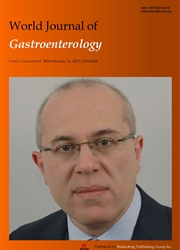

 中文摘要:
中文摘要:
AIM To verify whether curcumin(Cur) can treat inflammatory bowel disease by regulating CD8+CD11c+ cells. METHODS We evaluated the suppressive effect of Cur on CD8+CD11c+ cells in spleen and Peyer’s patches(PPs) in colitis induced by trinitrobenzene sulfonic acid. Mice with colitis were treated by 200 mg/kg Cur for 7 d. On day 8, the therapeutic effect of Cur was evaluated by visual assessment and histological examination, while co-stimulatory molecules of CD8+CD11c+ cells in the spleen and PPs were measured by flow cytometry. The levels of interleukin(IL)-10, interferon(IFN)-γ and transforming growth factor(TGF)-β1 in spleen and colonic mucosa were determined by ELISA.RESULTS The disease activity index, colon weight, weight index of colon and histological score of experimental colitis were obviously decreased after Cur treatment, while the body weight and colon length recovered. After treatment with Cur, CD8+CD11c+ cells were decreased in the spleen and PPs, and the expression of major histocompatibility complex Ⅱ, CD205, CD40, CD40 L and intercellular adhesion molecule-1 was inhibited. IL-10, IFN-γ and TGF-β1 levels were increased compared with those in mice with untreated colitis.CONCLUSION Cur can effectively treat experimental colitis, which is realized by inhibiting CD8+CD11c+ cells.
 英文摘要:
英文摘要:
AIM To verify whether curcumin (Cur) can treat inflammatory bowel disease by regulating CD8(+)CD11c(+) cells. METHODS We evaluated the suppressive effect of Cur on CD8(+)CD11c(+) cells in spleen and Peyer's patches (PPs) in colitis induced by trinitrobenzene sulfonic acid. Mice with colitis were treated by 200 mg/kg Cur for 7 d. On day 8, the therapeutic effect of Cur was evaluated by visual assessment and histological examination, while co-stimulatory molecules of CD8(+)CD11c(+) cells in the spleen and PPs were measured by flow cytometry. The levels of interleukin (IL)-10, interferon (IFN)-gamma and transforming growth factor (TGF)-beta 1 in spleen and colonic mucosa were determined by ELISA. RESULTS The disease activity index, colon weight, weight index of colon and histological score of experimental colitis were obviously decreased after Cur treatment, while the body weight and colon length recovered. After treatment with Cur, CD8(+)CD11c(+) cells were decreased in the spleen and PPs, and the expression of major histocompatibility complex., CD205, CD40, CD40L and intercellular adhesion molecule-1 was inhibited. IL-10, IFN-gamma and TGF-beta 1 levels were increased compared with those in mice with untreated colitis. CONCLUSION Cur can effectively treat experimental colitis, which is realized by inhibiting CD8(+)CD11c(+) cells.
 同期刊论文项目
同期刊论文项目
 同项目期刊论文
同项目期刊论文
 期刊信息
期刊信息
